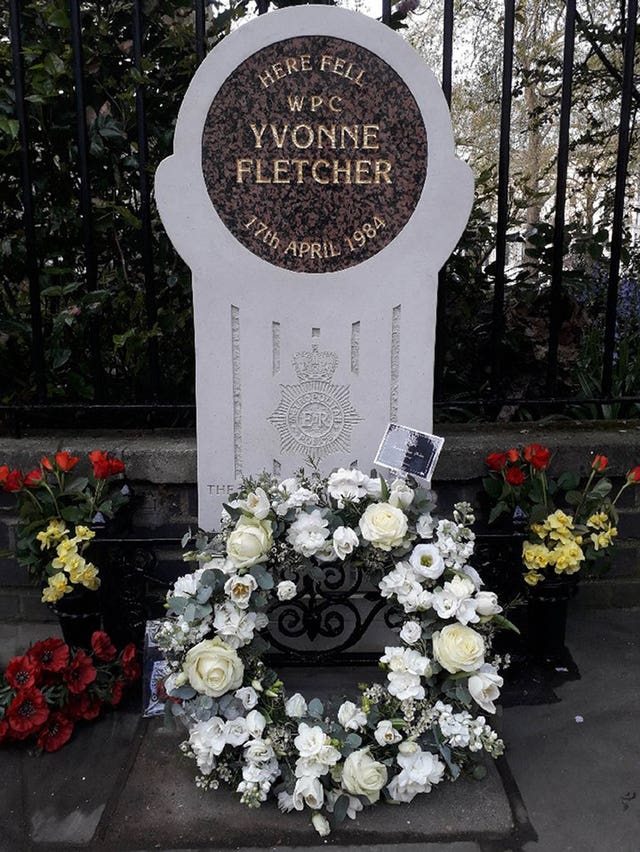Victory in court bid to find Gaddafi aide liable for Pc Yvonne Fletcher shooting
Her former colleague John Murray, 66, brought a civil claim for a nominal amount of £1 against Saleh Ibrahim Mabrouk.

A retired police officer has won his High Court bid to hold Colonel Muammar Gaddafi’s ex-aide jointly liable for the fatal shooting of Pc Yvonne Fletcher 37 years ago.
Pc Fletcher, 25, was killed while policing a demonstration against the former Libyan leader outside his country’s embassy in St James’s Square in central London on April 17 1984.
Her former colleague John Murray, 66, brought a civil claim for a nominal amount of £1 against Saleh Ibrahim Mabrouk as part of his decades-long attempt to find “justice” for his dead friend.
Lawyers for Mr Murray accused Mr Mabrouk, who denied any wrongdoing, of being “jointly liable” for the shooting, arguing that, while he did not fire any shots, he was “instrumental” in the “orchestration” of a plan to use violence at the protest.

The court heard that Mr Murray, from Chingford, east London, promised his dying colleague he would find those responsible for the shots that were fired from an embassy window.
Giving his judgment on Tuesday morning, Mr Justice Martin Spencer said that “those responsible for the shooting of Yvonne Fletcher also bear liability” to Mr Murray.
He added: “I am satisfied on the balance of probabilities that there existed a common design to respond to the planned anti-Gaddafi protest by using violence.”
The judge said the evidence pointed to Mr Mabrouk being an “active participant” in a “common deign to fire upon the demonstrators”.
He concluded: “Mr Murray has succeeded in showing that the defendant Saleh Ibrahim Mabrouk is jointly liable with those who carried out the shooting of Yvonne Fletcher, for the battery inflicted upon her”.
The judge’s ruling was met with applause in a packed courtroom, with Mr Murray shedding tears as the judgment was read out.
The judge described Mr Murray and Pc Fletcher, who worked together in central London’s Covent Garden, as “salt of the earth” who were “the very best of friends” and “the first port of call if anyone in the community had a problem”.
He told the court that Pc Fletcher died as a result of “a cowardly attack” when gunmen armed with Sterling submachine guns opened fire from the first-floor windows of the embassy on “unarmed and unsuspecting lawful demonstrators”, and who were “uncaring of the risk posed to police officers going about their normal duties”.
The judge added that there seemed to be “little doubt” that the actions of the gunmen were “orchestrated and sanctioned” by Gaddafi, who “could not tolerate dissent or disagreement”.
The judge said he was awarding the damages sought by Mr Murray “to vindicate his 37 year fight to bring to justice at least one of those responsible for the death of his colleague”.
Mr Mabrouk was arrested in 2015 in connection with Pc Fletcher’s death, but two years later the Metropolitan Police said charges could not be brought because key evidence had been kept secret to protect national security, the court was told last week.
Mr Murray’s legal team did not seek to rely on that evidence, instead referring the judge to disclosed material from the Met’s investigations, a ballistics report, transcripts from the inquest into Pc Fletcher’s death and photos of the scene of the shooting.

The court heard from an emotional Mr Murray who described being present at his friend’s post-mortem and a “dark period” of battling nightmares and flashbacks afterwards.
Ms Kaufmann said he suffered “distress, anxiety and serious psychiatric injury” as a result of the shooting and that at the time of the incident he feared he would also be shot.
Mr Mabrouk did not take part in court proceedings but previously denied any involvement in Pc Fletcher’s death, highlighting that he had been arrested earlier in the day, before the shots were fired.
He noted Libya previously admitted responsibility over Pc Fletcher’s killing and paid compensation to her mother, the court was told.
But Ms Kaufman said it was “inconceivable” that Mr Mabrouk was “not at the heart of decision-making in relation to the use of armed violence against the anti-Gaddafi protesters” at the embassy.
The court was told he was a member of the pro-Gaddafi Libyan Revolutionary Committee that controlled the building in 1984.
Ms Kaufmann claimed Mr Mabrouk told a man from the Surveyors Department of the Met setting up barriers ahead of the protest that “we have guns here today, there is going to be fighting” before he was arrested.
According to a Libyan engineering student who had infiltrated “pro-Gaddafi elements” in the UK, Mr Mabrouk told meetings earlier in the year that Colonel Gaddafi had instructed him and others to take the embassy and spoke of “bombings and murders” to “scare the British authorities into withdrawing support from anti-Gaddafi movements”, the court was told.
The court also heard that Foreign and Commonwealth Office officials received warnings over potential consequences ahead of the protest, with Ms Kaufman suggesting that knowledge of a plan to use violence went “way up the hierarchy” in Libya.
In 2019, Mr Mabrouk was “excluded” from the UK over his “suspected involvement in war crimes and crimes against humanity”, the court was told.





